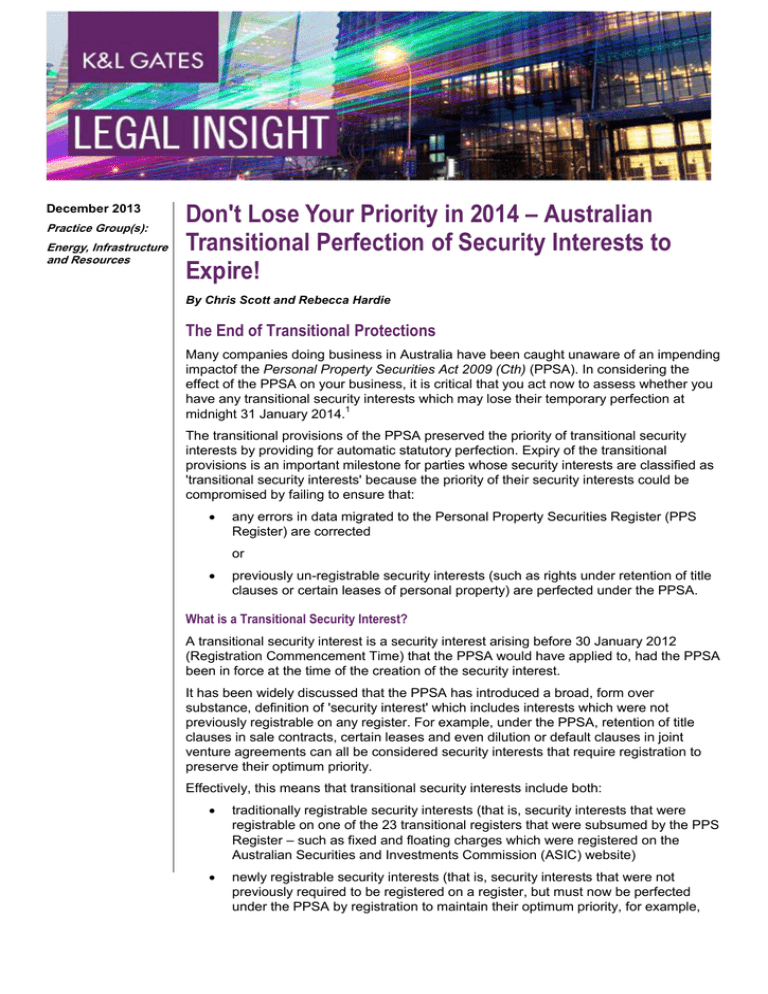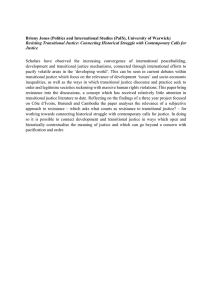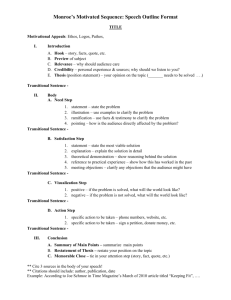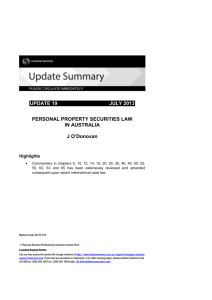
December 2013
Practice Group(s):
Energy, Infrastructure
and Resources
Don't Lose Your Priority in 2014 – Australian
Transitional Perfection of Security Interests to
Expire!
By Chris Scott and Rebecca Hardie
The End of Transitional Protections
Many companies doing business in Australia have been caught unaware of an impending
impactof the Personal Property Securities Act 2009 (Cth) (PPSA). In considering the
effect of the PPSA on your business, it is critical that you act now to assess whether you
have any transitional security interests which may lose their temporary perfection at
midnight 31 January 2014.1
The transitional provisions of the PPSA preserved the priority of transitional security
interests by providing for automatic statutory perfection. Expiry of the transitional
provisions is an important milestone for parties whose security interests are classified as
'transitional security interests' because the priority of their security interests could be
compromised by failing to ensure that:
any errors in data migrated to the Personal Property Securities Register (PPS
Register) are corrected
or
previously un-registrable security interests (such as rights under retention of title
clauses or certain leases of personal property) are perfected under the PPSA.
What is a Transitional Security Interest?
A transitional security interest is a security interest arising before 30 January 2012
(Registration Commencement Time) that the PPSA would have applied to, had the PPSA
been in force at the time of the creation of the security interest.
It has been widely discussed that the PPSA has introduced a broad, form over
substance, definition of 'security interest' which includes interests which were not
previously registrable on any register. For example, under the PPSA, retention of title
clauses in sale contracts, certain leases and even dilution or default clauses in joint
venture agreements can all be considered security interests that require registration to
preserve their optimum priority.
Effectively, this means that transitional security interests include both:
traditionally registrable security interests (that is, security interests that were
registrable on one of the 23 transitional registers that were subsumed by the PPS
Register – such as fixed and floating charges which were registered on the
Australian Securities and Investments Commission (ASIC) website)
newly registrable security interests (that is, security interests that were not
previously required to be registered on a register, but must now be perfected
under the PPSA by registration to maintain their optimum priority, for example,
Don't Lose Your Priority in 2014 – Transitional Perfection to Expire!
the registration of a security interest created by a retention of title clause in a
contract of sale or certain leases).
The Transitional Provisions
While the PPSA required perfection of security interests,, some temporary protection was
provided for transitional security interests pursuant to section 322(1) of the PPSA, in
order to preserve their priority and enforceability in insolvency from the Registration
Commencement Time.
Section 322(1) provides that transitional security interests in collateral are taken to be
perfected from immediately before the Registration Commencement Time. This
automatic statutory perfection under the PPSA ends when that transitional security
interest:
is migrated to the PPS Register
is perfected by being registered on the PPS Register (either through the effective
migration of data to the PPS Register, effective preparatory registration prior to
the Registration Commencement Time or amending a migrated registration on
the PPS Register to correct migrated data)
is perfected in another way (for example control)
or
remains unperfected at midnight on 31 January 2014 (because the transitional
security interest remains unregistered and has not been perfected in another way
provided for under the PPSA).
Traditionally Registrable Security Interests
In the case of traditionally registrable security interests that were registered on a register
prior to the commencement of the PPSA, this data was, in theory, migrated to the PPS
Register.
The process of migration of data from the pre-PPSA registers required the registrar to
determine the class of personal property which the financing statement for the migrated
security interest would be registered against. However, if the migrated data is registered
in the incorrect class, the incorrectly registered data is taken to have never been
registered on the PPSA.
Further, when data was migrated from the ASIC Register of Company Charges to the
PPS Register, technical issues resulted in approximately 6000 charges which were
registered on the ASIC Register of Company Charges not being migrated to the PPS
Register. These securities are now at risk of losing their priority as a transitional security
interest that was registrable on a pre-PPSA register but was not in fact registered does
not have the benefit of the transitional provisions. For a list of the affected charges, click
here.
The transitional period provides temporary perfection through the migration process
allowing secured parties time to confirm that their security interests have been properly
migrated to the PPS Register. Where an error in migration is a result of the Registrar's
determination (rather than the quality of the data on the pre-PPSA register) or a technical
issue in relation to the migration of data, the optimum priority for that security interest
may still be able to be preserved where the registration is amended before midnight on
31 January 2014.
2
Don't Lose Your Priority in 2014 – Transitional Perfection to Expire!
To avoid losing priority at midnight on 31 January 2014, it is important that secured
parties of migrated security interests review the PPS Register to confirm that:
traditionally registrable security interests have been migrated to the PPS Register
the content of those registrations is correct and complies with the PPSA.
The consequences of failing to do this can potentially cause significant harm, as unlike
under the Torrens registration system for registering interests in land, there is no public
fund to provide compensation where a person suffers loss as a result of an error by the
Registrar of the PPSA.
Newly Registrable Security Interests
In the case of newly registrable security interests, the position is much simpler – from
midnight on 31 January 2014 if the security interest is not perfected (which in most cases
will require registration on the PPS Register), the security interest will lose its optimum
priority.
For example, a lease of personal property for more than one year which was created
before the Registration Commencement Time, and which was not previously registrable,
is likely to constitute a transitional security interest under the PPSA under which the
lessor is in the position of a secured party. The transitional security interest will have the
benefit of section 322(1) which presumes that the transitional security interest is taken to
be perfected from immediately before the Registration. However, to continue to be
perfected under the PPSA this transitional security interest must be correctly registered
on the PPS Register before midnight on 31 January 2014.
If the transitional security interest is not correctly registered before midnight on 31
January 2014 (when the temporary perfection ceases):
a later registered security interest will have priority over the unregistered
transitional security interest in insolvency because it has been perfected under
the PPSA
the lessor may find that it loses its rights of ownership of the collateral on the
insolvency of the lessee.
Next Steps
Whether intentionally or not, many secured parties of transitional security interests have
been relying on the transitional PPSA provisions which provide temporary perfection for
some time but the deadline for taking action is fast approaching.
Before midnight on 31 January 2014 every secured party (which includes suppliers under
retention of title clauses and lessors under certain leases of personal property) needs to
consider its PPSA exposure under existing contracts by:
reviewing contracts to determine whether the secured party has the benefit of any
transitional security interests
in relation to traditionally registrable transitional security interests, confirming that:
o
they have been migrated to the PPS Register
o
the content of those registrations is correct and complies with the PPSA
(and to the extent there are any errors, amending the registration
appropriately).
3
Don't Lose Your Priority in 2014 – Transitional Perfection to Expire!
perfecting any newly registrable transitional security interests (such as retention
of title rights).
Importantly, action must be taken well before midnight on 31 January 2014 (Canberra
time) so that the necessary steps to preserve the optimum priority of your security
interests under the PPSA can be implemented.
References
1
http://www.ppsr.gov.au/AsktheRegistrar/InformationSheets/Pages/Transitional_provision
s.aspx
Authors:
Chris Scott
chris.scott@klgates.com
+61 8 9216 0933
Rebecca Hardie
rebecca.hardie@klgates.com
+61 8 9216 0921
Anchorage Austin Beijing Berlin Boston Brisbane Brussels Charleston Charlotte Chicago Dallas Doha Dubai Fort Worth Frankfurt
Harrisburg Hong Kong Houston London Los Angeles Melbourne Miami Milan Moscow Newark New York Orange County Palo Alto
Paris Perth Pittsburgh Portland Raleigh Research Triangle Park San Diego San Francisco São Paulo Seattle Seoul Shanghai
Singapore Spokane Sydney Taipei Tokyo Warsaw Washington, D.C. Wilmington
K&L Gates practices out of 48 fully integrated offices located in the United States, Asia, Australia, Europe, the
Middle East and South America and represents leading global corporations, growth and middle-market
companies, capital markets participants and entrepreneurs in every major industry group as well as public
sector entities, educational institutions, philanthropic organizations and individuals. For more information
about K&L Gates or its locations, practices and registrations, visit www.klgates.com.
This publication is for informational purposes and does not contain or convey legal advice. The information herein should not be used or relied upon
in regard to any particular facts or circumstances without first consulting a lawyer.
©2013 K&L Gates LLP. All Rights Reserved.
4








